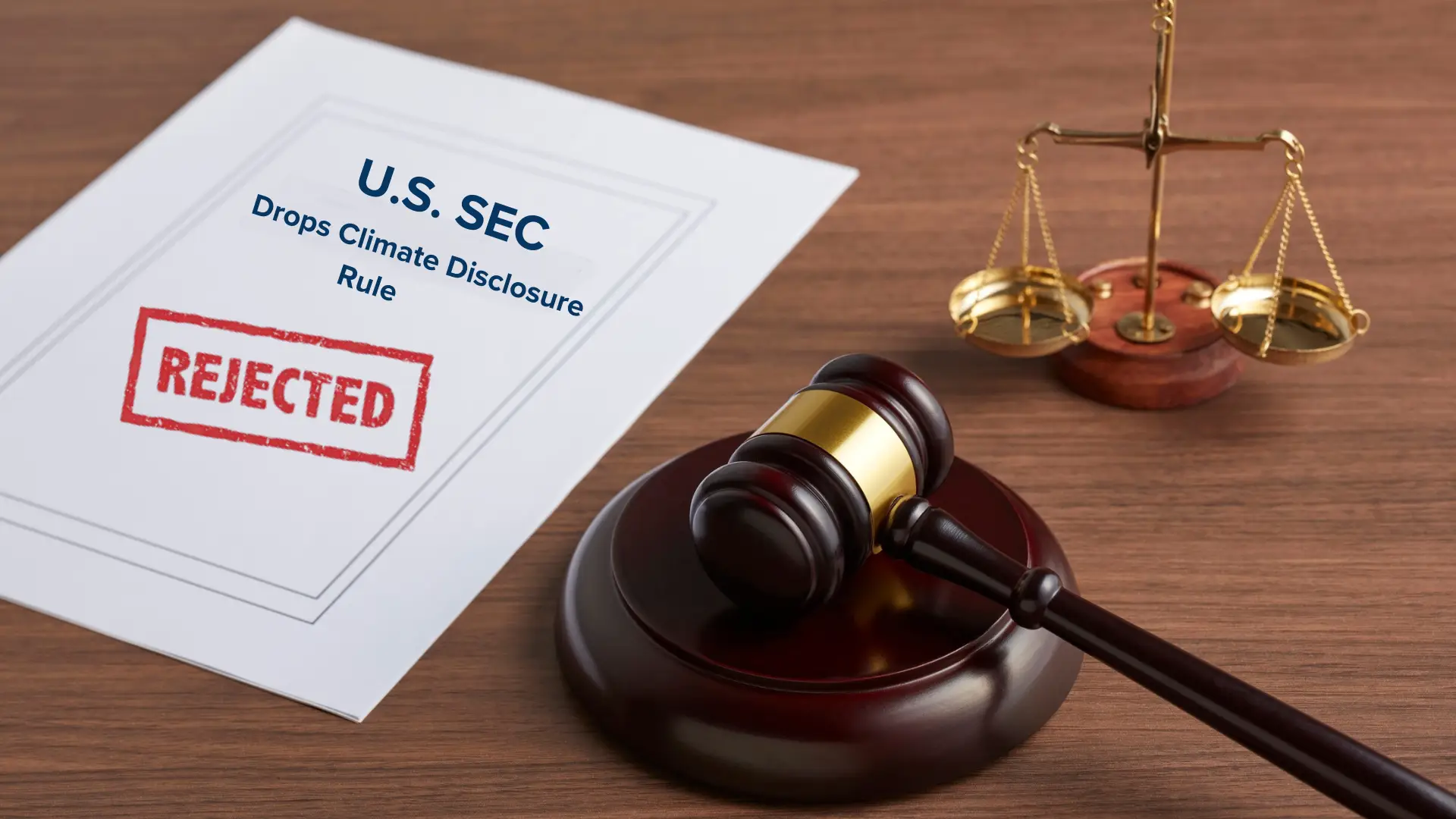After the European Omnibus proposals last week, the U.S. SEC dropped its defense of the climate disclosure rule after only one year of existence, halting its implementation. The rule, which required large companies to report their climate-related risks and emissions, faced fierce opposition and legal challenges. With President Trump’s administration shifting priorities, Acting SEC Chairman Mark Uyeda, who also voted against the rule, is now leading the effort to withdraw it, calling it “costly and unnecessarily intrusive” (SEC).
Is the SEC announcement a setback for ESG regulation and sustainability efforts, or a catalyst reshaping the market and the future of careers in sustainability?
While this decision reduces federal climate reporting mandates, companies, particularly listed or large organisations, are still required to comply with state-level regulations, such as those in California, and international frameworks like the EU’s Corporate Sustainability Reporting Directive (CSRD).
Furthermore, the pressure to address climate concerns is driven by the need to meet investor expectations, respond to consumer demands for climate action, and maintain a strong reputation. These factors are becoming essential components of competitive advantage.
As climate awareness grows among consumers, civil society, and advocacy groups, pressure for corporate accountability continues to mount. Investors are demanding greater transparency, rigorous ESG reporting, and tangible climate action. At the same time, consumers are increasingly drawn to brands that demonstrate genuine commitments to sustainability and ethical governance.
Companies are increasingly acknowledging that failing to address stakeholder demands goes beyond reputational risk, it directly impacts their competitiveness and financial performance. Business leaders recognise Climate risk as a critical business challenge, prompting organisations of all sizes to integrate climate-related risks into their enterprise risk management frameworks. This proactive approach enhances resilience, safeguards assets, and ensures long-term corporate responsibility in an evolving market landscape.
The convergence of these pressures is reshaping corporate strategies, compelling companies to prioritise transparency, accountability, and climate resilience through effective risk management to mitigate business vulnerabilities.
As some markets roll back legislation on reporting requirements, inconsistencies in standards are expected to increase, undermining data quality, coherence, and comparability. Without comprehensive regulatory frameworks, the burden of ensuring accountability and transparency will increasingly fall on private markets, international standards bodies like ISSB, and scoring agencies. These entities will play a critical role in setting benchmarks and driving consistent market standards. Voluntary frameworks, global standards, and international regulations will also be relied upon to provide guidance and best practices, offering companies a clear pathway to improve transparency and credibility.
Ultimately, a more liberal, market-driven approach may emerge, where public and private sectors challenge each other to uphold rigorous sustainability standards through innovation, competition, and voluntary adherence to high-quality frameworks. This evolving landscape is presenting new opportunities and pathways for individuals pursuing a career in sustainability, as the demand for skilled professionals continues to rise in this critical area.
What does this mean for the US and the Global Sustainability Career Market?
At EnableGreen, we anticipate that the SEC’s decision, like the EU Omnibus, will prompt a shift— not a setback—in corporate sustainability commitments. The strong demand for ESG specialists is, therefore, expected to persist. Despite ongoing global regulatory uncertainty, market pressure is escalating to unprecedented levels and will continue to intensify as climate-related disasters grow more frequent and increasingly localised. Companies are under greater scrutiny to demonstrate tangible sustainability efforts, making skilled ESG professionals more essential than ever.
For sustainability job seekers, the shifting landscape offers more opportunities than setbacks. As companies adapt to evolving investor and consumer demands for transparency, accountability, and resilient business practices, the need for skilled ESG professionals remains high.
Amid regulatory uncertainty, many organisations are moving beyond mandatory reporting and compliance to prioritise climate risk analysis, carbon reduction, green finance, and ethical governance. This proactive approach is focused on building resilience, enhancing credibility, and ensuring long-term sustainability.
Consequently, companies will keep actively seeking experts across various sustainability roles—from ESG reporting specialists and climate risk analysts to sustainability strategists, ethical trade experts, and green finance professionals. The demand for talent and leaders capable of navigating complex challenges and advancing corporate sustainability efforts continues to grow, driven by market pressures and evolving stakeholders’ expectations.
At EnableGreen, we are proud to be at the forefront of the sustainability market transformation. We understand that growing corporate urgency around sustainability is fueling a consistent, high demand for specialised expertise across all sectors.
For corporate clients seeking to enhance their sustainability efforts with top-tier talent, EnableGreen offers tailored recruitment solutions designed to identify the right expertise for your organisation’s specific needs. Contact us to discuss your hiring requirements and build a team that will drive your sustainability strategy forward.
For candidates looking to evolve in the sustainability space, we encourage you to apply or submit your CV to EnableGreen. Whether you are an ESG reporting specialist, climate risk analyst, sustainability strategist, ethical trade expert, or green finance professional, we can connect you with companies committed to advancing their sustainability goals.
Reach out to us today and take the next step in your career in sustainability.
Related post:





